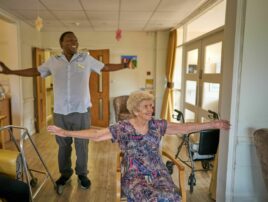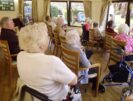
Tuesday 18th February 2020
How your legs grow your brain and juggling keeps it sharp
Louise Morse
Until quite recently scientists believed that our brains became fully developed in adulthood and remained static during our lifetimes. Now it’s known that the brain is ‘plastic’ and changes its structure in response to learning, or practising a hobby or skill. Studying the brains of London cab drivers, the neuro imaging centre at University College London showed that they had enlarged a part of their brain, the hippocampus, by acquiring the ‘knowledge’, an extensive period of learning the map of the city, and by constantly navigating its maze of streets. The hippocampus is the part of the brain responsible for ‘executive function’, that is, keeping plates spinning in the present and turning short term memories into long ones. Surprisingly, our legs play an important part in the health of our hippocampi, or rather what we do with them. A study shows that the hippocampi of older adults who walked briskly for 40 minutes three days a week grew by 2%, whereas a control group that didn’t walk saw it shrink by 1% due to ‘normal ageing’.
The hippocampus is the part that helps you juggle thoughts and activities, like making cup of tea while holding a conversation and wondering where you’ve put the biscuit tin all at the same time. It’s called ‘executive function’. At the Hallamshire Memory clinic in Sheffield part of the test to discover if someone was developing dementia was to ask three or four questions to be answered in a single sentence.
Juggling in real life also does more good than we realise. According to psychiatrist Max Pemberton the intense concentration stills the mind more effectively than practising mindfulness and sharpens focus and coordination. It is also a good exercise helping maintain and improve the range of motion in the upper limbs. Start with throwing one ball from hand to hand, then two, and work your way up to 3, or more.
A couple of his ‘100 Health Secrets to Transform your Life’ are particularly helpful these days in avoiding the coronavirus. He suggests that you avoid touching handrails on buses and trains as much as you can, as they are ‘heaving with bugs from people’s hands’. We need to wash our hands more frequently than most of us usually do. We should wash them when we arrive at work, before and after eating, and when we get home is an absolute minimum. It’s noticeable that people in the gym I using antibacterial wipes on equipment handles before they use them.


































